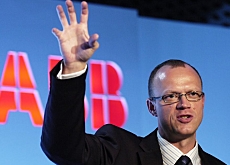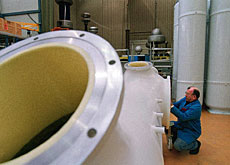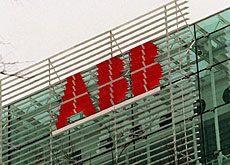ABB boss promises no let-up

ABB chief executive Fred Kindle tells swissinfo he won't take his foot off the pedal at the resurgent engineering firm despite joining the board of another company.
Kindle, 46, explains how he plans to combine his role at ABB with a directorship at Zurich Financial Services (ZFS). ZFS shareholders will vote on his appointment in April.
ABB has swung into the black for the first time in five years, following a tough period when the Swiss-Swedish concern nearly went bust. The company posted a net income of $735 million (SFr963 million) in 2005, compared with a loss of $35 million the previous year.
ABB also recently received the good news that a $1.4-billion asbestos compensation claim in the United States against their Combustion Engineering subsidiary could soon be settled. Separate but smaller asbestos litigation concerning ABB Lummus Global is still in progress.
The only black cloud hanging over ABB is a suspected case of illegal payments made by employees in the Middle East, which was detected by the company and voluntarily reported to the US authorities.
swissinfo: ABB has published a profit for 2005 and you have accepted a proposed position on the ZFS board. Does this mean you are relaxing at ABB?
Fred Kindle: We feel that the situation is much more under control that it has been in the past five years since the crises erupted. But I am never relaxed. I am not a guy who sits back, puts his feet up and enjoys the ride.
The work we have put into our new system [at ABB] allows me to say I can achieve the priorities here and also to emphasise a few other points.
There is a mutual benefit about me being on the ZFS board. I bring industrial know-how while I get to learn about how ZFS manages risks, which is the core of their existence. It is a win-win situation.
swissinfo: You say ABB has entered a new phase of profitable growth. Is that possible to achieve merely through organic growth or do you foresee future acquisitions?
F.K.: It is more valuable to create profit and growth by organic means, but of course the company should eventually be back in the position to make targeted acquisitions.
Once we are there, we are going to do it in a disciplined manner. My philosophy is that we are not just spending shareholders’ money. I look on it as if I am spending my own money and I would want to spend that wisely.
There are different reasons that acquisitions would make sense according to different areas of the company. We may strengthen our geographic market position, add technology or look for cost savings.
swissinfo: You recently reported suspected illegal payments by ABB in the Middle East. Can you comment on this?
F.K.: First of all I must say that this case has not yet been examined so nothing has been proved one way or the other.
True success cannot be measured simply in terms of financial success. There is another dimension that includes business ethics. We have to excel not only in our balance sheet but in our practices in the market place, and there we still have to focus.
swissinfo: You have been unable to sell ABB Lummus Global because of the asbestos litigation against it. In the meantime it has turned around and is making a profit. Is this a silver lining in the whole asbestos issue?
F.K.: A few years ago ABB was between a rock and a hard place because we had to sell businesses to generate cash, but we had to sell at a time when we could get very little money.
With Lummus the opposite was true. We could not sell it and it has turned into a profit contributor. It is still classified as non-core – that means in all likelihood we will not be in this business in the future [sell-off plans remain in place].
It would be rather opportunistic to reclassify it as core, and our long-term strategy requires clarity. The fact that it is now profitable means that if we sold it at some point there is more value in the sale than before.
swissinfo-interview: Matthew Allen in Zurich
Financial figures 2005
Sales: $22.442 billion (up by 8.9% on 2004)
Ebit: $1.742 billion (+66.5%)
Net profit/loss: $735 million (from -$35 million in 2004)
ABB plans to pay out a dividend of $0.12 per share – the first dividend since 2000.
Asea of Sweden and BBC Brown Boveri of Baden, Switzerland, merged in 1988 to form ABB.
After an initially successful expansion, ABB almost collapsed in 2001, with a record loss of $691 million.
Fred Kindle was appointed as CEO in January 2005, after four months in joint control with chairman Jürgen Dormann, who has been credited with starting the company’s revival of fortunes since 2002.
Insurance giant Zurich Financial Services announced on Wednesday that they will recommend to shareholders at their AGM on April 20 that Kindle join their board of directors. Kindle will, however, remain ABB CEO and combine the roles.

In compliance with the JTI standards
More: SWI swissinfo.ch certified by the Journalism Trust Initiative













You can find an overview of ongoing debates with our journalists here . Please join us!
If you want to start a conversation about a topic raised in this article or want to report factual errors, email us at english@swissinfo.ch.